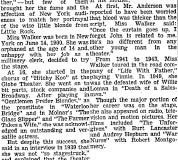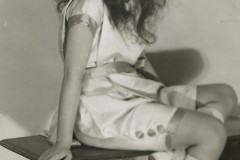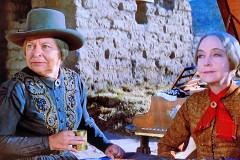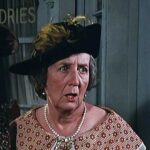The leads of the 1924 Season were June Walker and Norval Keedwell. (There is limited information about the career of June Walker, but information about Norval Keedwell is even more sparse.)
June Walker was the first actress to portray the character of Lorelei Lee, in the 1926 Broadway production of Gentlemen Prefer Blondes.
“As the first actress to portray Lorelei Lee, June Walker was instrumental in an interpretation that helped define the character. She was said to have ‘played a role that was as much her creation as that of Anita Loos… Tossing her golden curls, blinking her eyes and twirling her waist-length string of pearls,’ Walker’s version of Lorelei embodied the flapper of the Roaring Twenties. The success of the play launched Walker’s career, and she had further Broadway successes.”
[See NYT Obituary]
New York Times Obituary for June Walker:
June Walker, a stage and motion picture actress whose roles ranged from the flapper of the nineteen-twenties to the warm- hearted mothers she played of more recent years, died yesterday at the home of her son, the actor John Kerr. She was 65 years old and had been in ill health for the last five years.
Pearls and Golden Curls
June Walker, tossing her golden curls, blinking her eyes and twirling her waist-length string of pearls, proved for the first time on Broadway that “Diamonds are a Girl’s Best Friend.”
As the first Lorelei Lee she played a role that was as much her creation as that of Anita Loos who wrote the book that became the comedy, “Gentlemen Prefer Blondes.” The play opened at the Times Square Theater on Sept. 28, 1926 and ran for 199 performances.
Miss Walker went on to other successes “The Glass Slipper,” “Waterloo Bridge,” Death of a Salesman” and “Life with Father,” — but few of them brought her the fame and the affection of New York audiences to match her portrayal of the wise little blonde from Little Rock.
Miss Walker was born in New York on June 14, 1900. She was orphaned at the age of 14 and, unhappy with her job as a millinery clerk, decided to try the stage.
At 16, she started in the chorus of “Hitchy Koo” at the Globe Theater. She went on to bit parts, stock companies and Broadway. After playing in “Gentlemen Prefer Blondes,” as the prostitute in “Waterloo Bridge” and in Molnar’s “The Glass Slipper” and “The Farmer Takes a Wife,” she was acknowledged an outstanding and versatile actress.
But despite this success, she said in an interview in 1939 that she was not “so stagestruck,” and explained that the theater “Interferes so much with the things I want to do-be with John, fix the house, see people. But you must make a living, you know.”
Played Laurey Williams
In a memorable role, she caught the mischievous girlishness of Laurey Williams in a 1931 Theater Guild production of “Green Grow the Lilacs.” This folk play, in which she played opposite Franchot Tone and in which Lee Strasberg had the small role of a peddler, became the musical “Oklahoma!”
Miss Walker has been credited with discovering the actor Henry Fonda while he played the young tutor in Molnar’s “The Swan” in summer stock. She proposed him for the male lead in Marc Connelly’s, “The Farmer Takes a Wife.” The 1937 play gave Mr. Fonda his first major stage role and then his first film.
In 1940 Miss Walker appeared in a production of Shakespeare’s “Twelfth Night” with Maurice Evans and Helen Hayes.
Brooks Atkinson wrote in The New York Times: “Everyone should feel fortunate in having June Walker play Maria. She speaks clearly, which is a blessing, but beyond that she is honestly hearty in expression of character, running around the stage with genuine excitement over the mischief Maria has invented- full and free in merriment.”
Miss Walker’s son, Mr. Kerr, who appears in the television series “Peyton Place,” is the child of her 1926 marriage to the British actor and playwright Geoffrey Kerr. They were divorced in 1943.
The son, who won critical acclaim for his roles in “Tea and Sympathy,” on stage and in the film, and “Bernadine,” played in Robert Anderson’s “All Summer Long” in 1954. Miss Walker played the part of his mother.
At first, Mr. Anderson was reported to have been worried that blood was thicker than the script. Miss Walker said: “Once the curtain goes up, I forget John is related to me. He’s no different from any other young man in the
theater.”From 1941 to 1943, Miss Walker toured in the road company of “Life with Father,” playing Vinnie. In 1949, she was the defeated wife of Willie Loman in “Death of a Sales- man.”
Though the major portion of her career was on the stage, she also appeared on radio, television, and motion pictures. Her films included “The Unforgiven” with Burt Lancaster and Audrey Hepburn and “War Nurse” with Robert Montgomery.
“June Walker, 65, First Lorelei Lee: Broadway Star Dies” The New York Times, 5 February, 1966.
Seasons at the Theatre
- 1924
Productions/Roles:
- The Changelings, by Lee Wilson Dood (Week of June 15, 1924)
- Rolling Home, by John Hunter Booth (Week of June 22, 1924)
- The New Poor, by Cosmo Hamilton (Week of June 29, 1924)
- Across the Street, by Richard A. Purdy (Week of July 6, 1924)
Notable Roles, Awards, and Other Work:
- June Walker was the first actress to portray the character of Lorelei Lee, in the 1926 Broadway production of Gentlemen Prefer Blondes. (The role later played by Marilyn Monroe in the film version.)
Elitch Theatre Connections:
- Here is a great “Six-degrees of Separation” for the theatre… June Walker’s son, John Kerr, appeared in the play, Bernardine, written by Denver playwright Mary Chase, writer of Harvey!





















